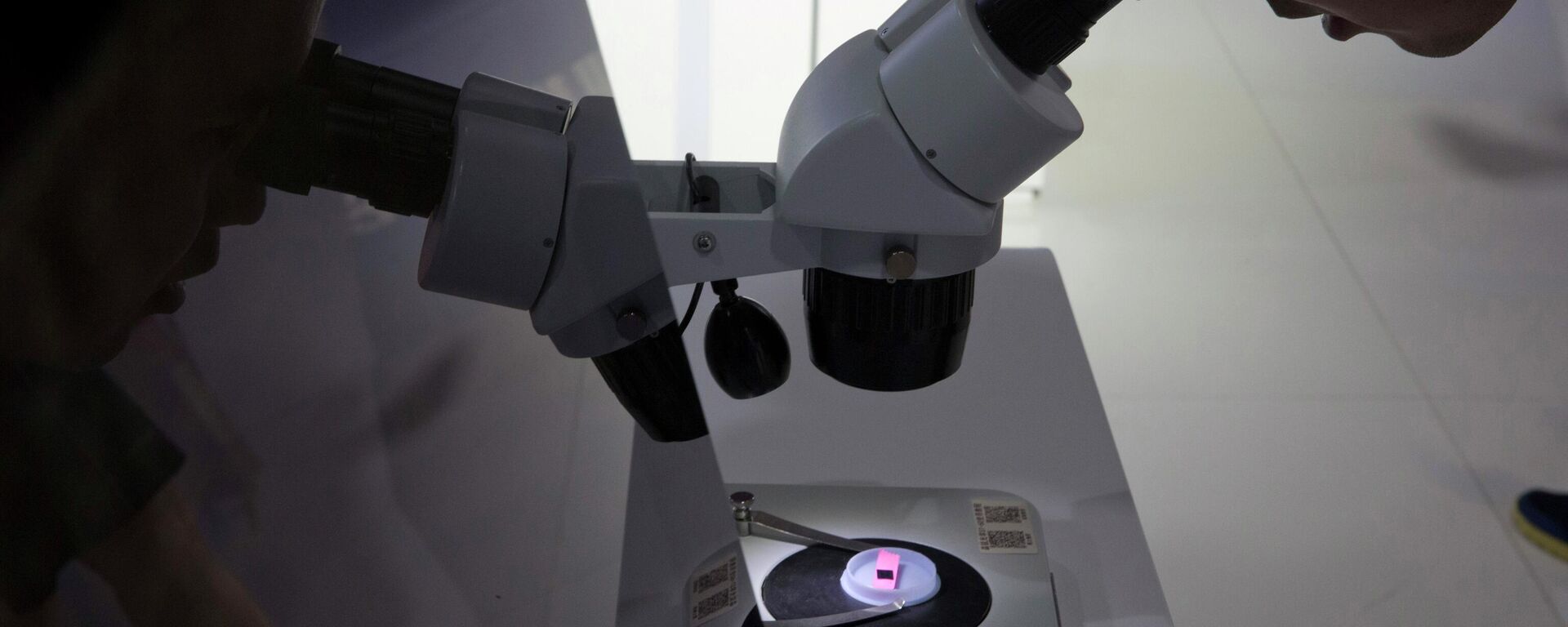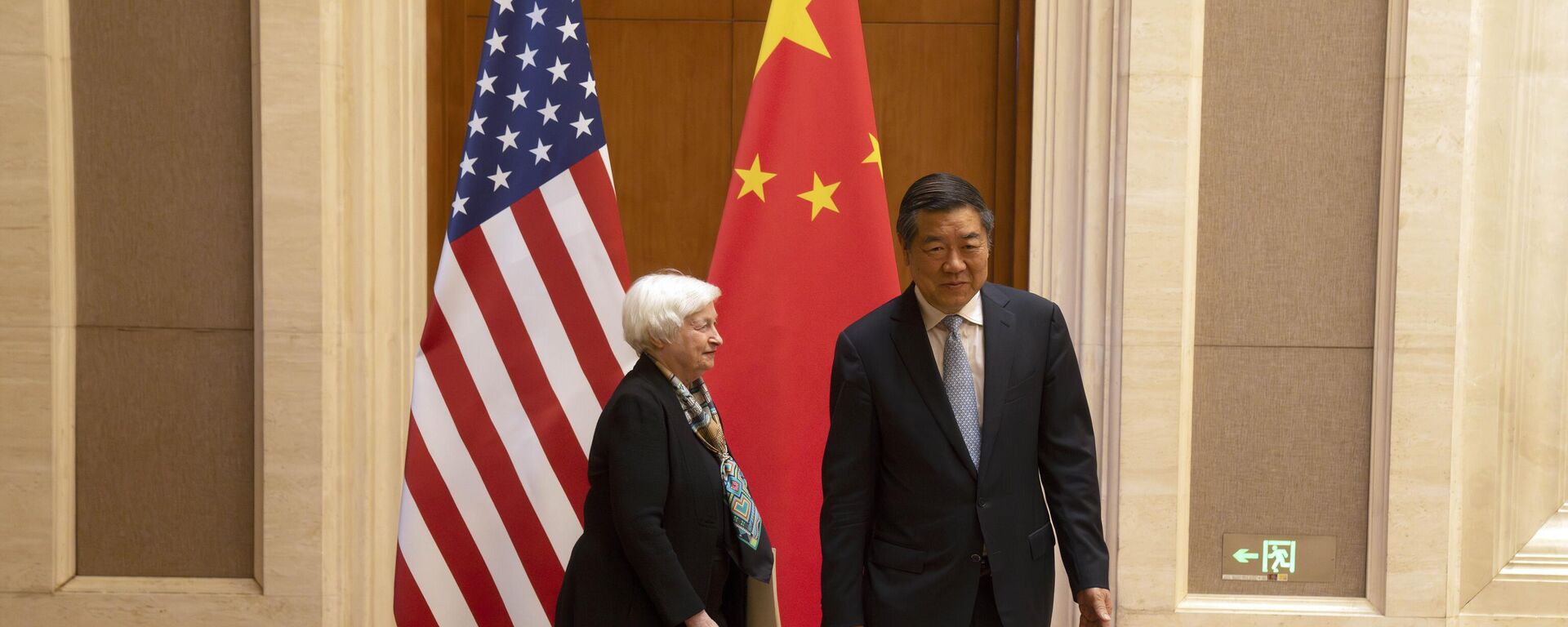https://sputnikglobe.com/20231205/chinas-credit-outlook-negative-as-worlds-second-largest-economy-slows-moody-says-1115415101.html
China’s Credit Outlook ‘Negative’ as World’s Second-Largest Economy Slows, Moody Says
China’s Credit Outlook ‘Negative’ as World’s Second-Largest Economy Slows, Moody Says
Sputnik International
Credit rating agency Moody’s downgraded its outlook for the Chinese government’s credit on Tuesday, the first time it was rated as “negative” since 2017.
2023-12-05T22:41+0000
2023-12-05T22:41+0000
2023-12-05T22:39+0000
economy
china
moody’s
credit
economic growth
economic outlook
https://cdn1.img.sputnikglobe.com/img/07e5/0a/1d/1090312700_0:320:3071:2047_1920x0_80_0_0_ab70932b6992ca5fbceec61b43e0850c.jpg
Moody's said its decision "reflects rising evidence that financial support will be provided by the government and wider public sector to financially stressed regional and local governments and state-owned enterprises."The Chinese economy has been steadily slowing since before 2020, when it was subjected to the convulsions of the COVID-19 pandemic lockdowns just as Chinese regulators cracked down on excessive real estate borrowing in response to a series of large-scale debt defaults by property developers. The US-directed trade war with China, which has targeted broad swaths of its economy including the tech field and exports from Xinjiang, has also left its mark.The Chinese Ministry of Finance said it was “disappointed” with Moody’s decision, noting the country’s economy has already recovered from its nadir.Moody’s said it expects China’s economy to grow at 4% each in 2024 and 2025, then decline slightly to 3.8% until 2030, when it expects the Chinese economy to slow to 3.5% growth. The agency said “weaker demographics” caused by an aging population will require “substantial and coordinated reforms” to help the country maintain its consumer spending and higher value-added manufacturing.The agency’s numbers are considerably below other estimates for Chinese growth in the coming years. The Organization for Economic Cooperation and Development (OECD) projected last month for China’s gross domestic product to grow by 4.7% next year and 4.2% in 2025 “on the back of ongoing stresses in the real estate sector and continued high household saving rates.” The International Monetary Fund (IMF) said recently it expects China’s GDP to grow by 4.6% in 2024 and 4.2% in 2025. Goldman Sachs said on Tuesday it expects China’s GDP to grow by 5% next year."We need to adopt expansionary fiscal and monetary policy to stimulate aggregate demand," one Chinese government economist told US media. "Corporate investment demand will not be strong as the confidence of companies has not recovered, so we need to expand infrastructure investment.”
https://sputnikglobe.com/20231205/us-sommerce-shief-hypes-china-threat-illusion-assaulting-chip-firms-counterproductive-1115398907.html
https://sputnikglobe.com/20231106/yellen-us-can-compete--work-with-china-ahead-of-meeting-with-beijings-economic-chief-1114771160.html
china
Sputnik International
feedback@sputniknews.com
+74956456601
MIA „Rossiya Segodnya“
2023
News
en_EN
Sputnik International
feedback@sputniknews.com
+74956456601
MIA „Rossiya Segodnya“
Sputnik International
feedback@sputniknews.com
+74956456601
MIA „Rossiya Segodnya“
is china's economy strong, china credit rating, how good is the chinese economy
is china's economy strong, china credit rating, how good is the chinese economy
China’s Credit Outlook ‘Negative’ as World’s Second-Largest Economy Slows, Moody Says
Credit rating agency Moody’s downgraded its outlook for the Chinese government’s credit on Tuesday, the first time it was rated as “negative” since 2017.
Moody's said its decision "reflects rising evidence that financial support will be provided by the government and wider public sector to financially stressed regional and local governments and state-owned enterprises."
The agency said this was "posing broad downside risks to China's fiscal, economic and institutional strength” and that its decision "reflects the increased risks related to structurally and persistently lower medium-term economic growth and the ongoing downsizing of the property sector.”
The Chinese economy has been steadily slowing since before 2020, when it was subjected to the convulsions of the COVID-19 pandemic lockdowns just as Chinese regulators cracked down on excessive real estate borrowing in response to a series of large-scale debt defaults by property developers. The US-directed trade war with China, which has targeted broad swaths of its economy including the tech field and exports from Xinjiang, has also left its mark.

5 December 2023, 09:36 GMT
The Chinese Ministry of Finance said it was “disappointed” with Moody’s decision, noting the country’s economy has already recovered from its nadir.
“Since the beginning of this year, in the face of the complex and harsh international situations, and against the background of an unstable global economic recovery and weakening momentum, China’s macro economy has continued to recover and has been advancing steadily,” the ministry said.
Moody’s said it expects China’s economy to grow at 4% each in 2024 and 2025, then decline slightly to 3.8% until 2030, when it expects the Chinese economy to slow to 3.5% growth. The agency said “weaker demographics” caused by an aging population will require “substantial and coordinated reforms” to help the country maintain its consumer spending and higher value-added manufacturing.
The agency’s numbers are considerably below other estimates for Chinese growth in the coming years. The Organization for Economic Cooperation and Development (OECD)
projected last month for China’s gross domestic product to grow by 4.7% next year and 4.2% in 2025 “on the back of ongoing stresses in the real estate sector and continued high household saving rates.” The International Monetary Fund
(IMF) said recently it expects China’s GDP to grow by 4.6% in 2024 and 4.2% in 2025. Goldman Sachs said on Tuesday it expects China’s GDP to grow by 5% next year.

6 November 2023, 19:32 GMT
Within China, which has a planned socialist economy with a large private capitalist sector, government planners are expecting a target of between 4.5% and 5.5% for 2024, although the final details will be worked out at the Communist Party’s annual Central Economic Work Conference later this month.
"We need to adopt expansionary fiscal and monetary policy to stimulate aggregate demand," one Chinese government economist told US media. "Corporate investment demand will not be strong as the confidence of companies has not recovered, so we need to expand infrastructure investment.”




